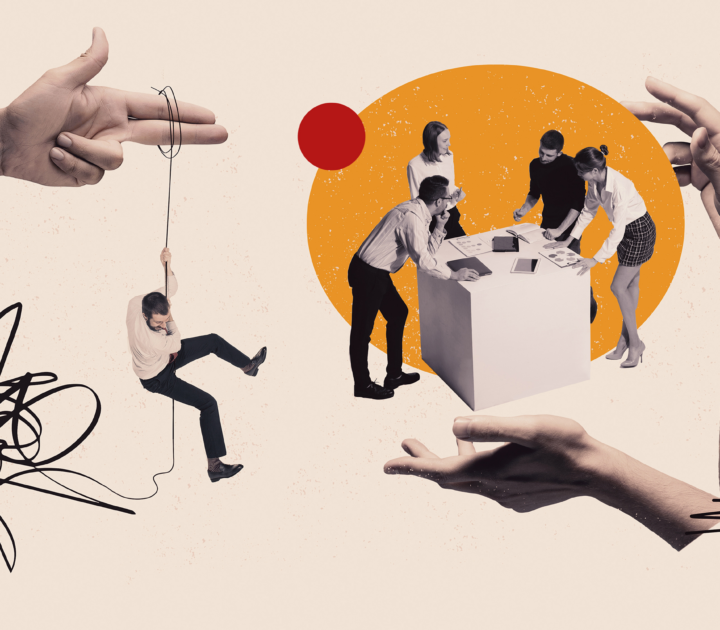
In this series, Visiting Professor of Leadership Nicholas Janni explores why rethinking a conventional leadership model – moving away from a constant drive towards growth and profit – is paramount to health and well-being.
Thinking and doing are dominant functions in our culture, resulting in a leader-as-executor ideal; this has severe implications as it reduces our feeling and sensing capacities.
By transitioning to a leader-as-healer approach focusing on being and connecting, we can learn to tolerate the discomfort generated by uncertainty and ambiguity, says Professor Janni.
A new vision of leadership
In the first session, “A new vision of leadership”, Professor Janni describes how the leader-as-healer ideal sees the world and its people with clearer perception and understanding. While we are in the middle of a life-changing pandemic, he argues, the bigger pandemic of fragmentation is a greater worry.
“Our thinking, our feeling and our sensing are now separate, they don’t operate as a coherent unit,” says Professor Janni. “We limit our relationship to the world and this has become normalized so we don’t even realize it.”
He urges a restoration of our deeper natural state, in which feeling, sensing and thinking operate as a coherent whole. According to Professor Janni, this has changed the lives of many people he has worked with, from entry-level to C-suite executives.

Why meditation/mindfulness are essential practices
“Paying attention deliberately – even to something as simple as our breathing – can have profound impacts on our entire lives,” says Professor Janni in “Why meditation/mindfulness are essential practices”.
In this second session, he reminds busy executives that meditation and mindfulness have been pursued by every culture around the world to access higher levels of consciousness.
Neuroscience research has shown that meditation affects brainwaves and allows us to go into “the zone” just like athletes for better workplace performance.
“Beyond stress reduction, it can allow us to open a much wider perception of the world,” says Janni.

Coming home to our bodies
In the third session, Professor Janni describes how we have become disconnected from our bodies.
“We live in a culture of fragmentation that is now normalized,” says Professor Janni. “As children, our world was intensely physical, but over the years we gradually become more and more disembodied.”
He discusses the need for creative play as well as exercises that channel our bodies through deliberate practice, like yoga or Tai chi: “Look at the CVs of many leaders and you’ll see they participate in these types of mind-body activities.”
By working on aligning their mind and body, a leader-as-healer creates a culture in which embodiment can flourish, opening new levels of energy and connectedness in and between people.

Emotional intelligence 2.0
The most important part of becoming a leader-as-header is also the most misunderstood – the idea that some emotions are positive while some are negative.
“As long as we remain locked in this mindset, it just creates more and more tension and fragmentation,” says Professor Janni. “In ‘Emotional Intelligence 2.0’ there is no such thing as positive or negative emotion.”
Professor Janni explains that fear itself – an emotion typically viewed as negative – does not block us; it is only a problem when we block that fear. Rewriting the way we relate to emotion is an essential part of becoming a leader-as-healer, he says.
“When we feel safe enough to simply allow the feeling of fear to pass in our bodies the very opposite of blockage occurs – fear connects us and actually opens our bodies…and then new channels of ideas open.”

Living a life of purpose
This fifth episode reminds you to pay attention or you might move away from your purpose – the thing represents the very essence of who you are.
“When we have purpose, we are aligned with our true selves,” says Professor Janni.
The idea that some emotions are positive while some are negative – the most important part of becoming a leader-as-header – is also the most misunderstood.
All research into happiness points to the fact that our deepest sense of purpose always occurs we’re giving and contributing, not when we’re taking.
“The leader-as-healer understands that we have ego needs and soul needs,” explains Professor Janni, “and recognizes and explores these different aspects of their being.”

Conclusion and integration
The final episode of the series reviews the differences between the leader-as-healer and the leader-as-executor. Understanding and recognizing these traits is vital for becoming a leader that builds people up rather than breaking them down.
“The leader-as-healer embodies a very high level of coherence that is the antidote to the pandemic of fragmentation from which the world is suffering,” says Professor Janni.
He goes on to explain that the leader-as-executor is someone that operates on a narrow bandwidth and is unable to care for people or see the bigger picture; becoming the leader-as-healer shows a commitment to building cultures of connection and presence in which people thrive.
“The leader-as-executor uses power as a blunt sword,” says Professor Janni, “while the leader-as-healer uses it like a scalpel and carefully excises what needs to be removed.”
When people feel taken care of, respected and listened to, this natural sense of contribution increases performance exponentially.
“Walking through the world with sense of calm is necessary in these increasingly volatile times,” concludes Professor Janni. “This will lead to a better outcome for all.”

Research Information & Knowledge Hub for additional information on IMD publications

in I by IMD 3 April 2024

in I by IMD 29 March 2024

![We are all activists [Video]](https://www.imd.org/ibyimd/wp-content/uploads/2024/03/IByIMD-BookClub-RELIVE-March28-IbyIMD-FeaturedImage-5x4-1250x1000-1-720x630.png)
![ACWA Power’s Marco Arcelli: "I’m the Chief Facilitating Officer" [Video]](https://www.imd.org/ibyimd/wp-content/uploads/2024/03/CEODialogue-MarcoArcelli-IbyIMD-Cards-5_3-1250x725-1-720x630.png)
in I by IMD 25 March 2024

Research Information & Knowledge Hub for additional information on IMD publications
Research Information & Knowledge Hub for additional information on IMD publications
Research Information & Knowledge Hub for additional information on IMD publications
Research Information & Knowledge Hub for additional information on IMD publications
in I by IMD 3 April 2024
Research Information & Knowledge Hub for additional information on IMD publications
in I by IMD 29 March 2024
Research Information & Knowledge Hub for additional information on IMD publications
Research Information & Knowledge Hub for additional information on IMD publications
Research Information & Knowledge Hub for additional information on IMD publications
in I by IMD 25 March 2024
Research Information & Knowledge Hub for additional information on IMD publications
Research Information & Knowledge Hub for additional information on IMD publications